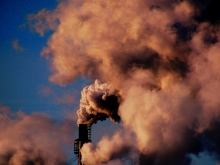Climate IPCC Report 2018 - PSI Reaction

PSI welcomes the UN Intergovernmental Panel on Climate Change (IPCC) Special Report on global warming released on 8 October 2018.
As suspected, the report shows that :
- Climate chaos is already here, sooner than expected and more intense, as seen with the more frequent and intense cyclones and hurricanes; extremes of heat and cold; wildfires from the Arctic down through the equator; ocean temperature rise and acidification; melting of polar ice, and more.
- We cannot accept a 2°C rise, must limit ourselves to a 1.5°C rise - the consequences of the .5°C difference are much worse than originally estimated.
- Major changes are needed, now, to avert uncontrollable climate chaos.
- Governments must use a range of tools to force/provoke unprecedented action.
Says Rosa Pavanelli, General Secretary of PSI:
“The current commitments made by governments under the Paris climate accord will see the world heat to 3°C, which is untenable. The latest report from the IPCC shows the need to act decisively and urgently. The labour movement must be part of the solution, and this will require some deep soul-searching on the part of union leaders and activists.”
“We need an honest discussion about our current model of capitalism. Our addictions to fossil fuels, to consumption and to never-ending growth need to be examined. Labour needs a real ‘just transition’ for those affected by the shift away from fossil fuels. But I suggest that we need much more. We need a new model for society, one that gives priority to people and planet over profit.”
Climate chaos will require more efforts to adapt, to create “resilient societies”. The first place this needs to happen is in our cities. Mayors and city councils are becoming aware and taking action. Municipal workers need to be involved, along with inhabitants, to design local adaptation measures.
Climate chaos will create more climate migration, as people are forced out of their homes and off their lands. Governments need to anticipate these movements of people, preferably by investing in adaptation through public infrastructure and services, such that people are not forced to move, or by preparing to receive the victims of climate chaos in ways that ensure their dignity, in respect of their human rights.
More climate chaos inevitably means more emergencies and disasters. PSI represents most emergency workers. These professionals are under increasing levels of stress as they are called on more frequently to deal with more intense weather events. This applies to first responders, but also to a range of public services : municipal workers; utilities of water, energy and transport; health and social service workers…
Says PSI vice president Annie Geron from the Philippines, “Emergency workers deserve all the support and respect that we can give them. These are people who must leave their families work in the most dangerous zones to protect and save other people. The inevitable climate chaos will put more demands on our emergency services, they will become even more central to protecting our communities.”
“I encourage all unions to read the ILO Guidelines on Public Emergency Services, as well as the PSI guidelines. These two documents are the result of years of trade union work and provide the bases for union strategies in emergency services.”

